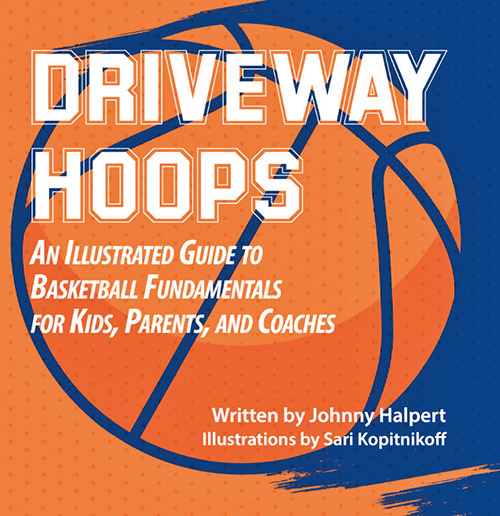
Reviewing: “Driveway Hoops: An Illustrated Guide to Basketball Fundamentals for Kids, Parents, and Coaches” by Jonathan Halpert. Advize Proactive Consulting, LLC. 2022. English. Hardcover. 144 pages. ISBN-13: 979-8985250909.
If you don’t know the name Johnny Halpert, you probably don’t follow college basketball. From 1972 until his retirement in 2013, Halpert was the coach of Yeshiva University’s men’s basketball team, the Maccabees. Upon his retirement, he was the longest-tenured college coach in New York City history and the seventh coach in New York City history to earn 400 victories.
But even if you do know the name Johnny Halpert, you might not know that he is more than an accomplished basketball coach. Since his retirement nearly a decade ago, the 78 year old has spent his time with his grandchildren (he and his wife, Aviva, have five children, 20 grandchildren, and three great grandchildren!), assisting other college coaches and writing books. His latest book, “Driveway Hoops,” is geared to children in sixth through 10th grades and is focused on teaching them the fundamentals of the game.

“I’m a big believer in the fundamentals of basketball,” Halpert told The Jewish Link. “Above all else, that’s what coaches should be teaching. And I learned from the best,” he said, referring to the legendary Red Auerbach, who coached Halpert during his own undergraduate time on the Yeshiva University basketball team.
“For the average kid, if you know the fundamentals of the game, you can play. And if you’re a good player, knowing the fundamentals will make you a very good player. And it’s the same at every level. Michael Jordan was the most fundamentally sound player I’ve ever seen. That’s what set him apart.” Halpert explained that at a certain level, all athletes have the athleticism, but knowing the fundamentals is truly rare.
Halpert said that because kids often aren’t taught the fundamentals of the game, they learn bad habits that they continue to reinforce over and over again. For example, he explained, “because baskets are high and balls are heavy and kids are short, it’s hard for kids to shoot properly, so they develop bad habits. They throw the ball from their stomachs instead of bending their knees.” It’s hard to unlearn these bad habits.
It’s the same for anything, Halpert said. “You can’t read Rashi without first learning the letters. You can’t do geometry without knowing how to multiply. It’s all about the fundamentals.”
What drives Halpert—to coach, and now to write? “It’s very important for all kids to have something that makes them feel good about themselves. Whether the kid is a Gemara scholar or a singer or a basketball player. For most kids, sports can play a very important role. Having people cheer for them gives them status and ego, which is essential for kids.” But in order to get to that next level, kids must master the fundamentals.
What would Halpert say to a kid who just doesn’t have the necessary athleticism for a team sport? “Kids recognize their own strengths,” he said, and don’t usually gravitate towards sports if they aren’t naturally athletic. Therefore, “it is imperative that parents and teachers find what that strength is for each child and nurture it, no matter what it is.” “That said,” he added, “even if you aren’t athletic at all, if you learn the fundamentals and you’re willing to practice, you are going to be able to play with your friends in gym or at recess.”
Halpert believes that being on a team imparts many life lessons. Kids are taught that if you try hard and study, you will succeed. “But that’s not always true,” he said. “What do you do when you try your hardest and do your best but you don’t succeed? The best place to learn that lesson is in competitive sports. Sports teaches you to analyze why you didn’t succeed, and what you can do differently.” Most importantly, sports teaches a kid not to give up and not to blame your losses on someone else. “I always thought I was teaching kids how to conduct themselves,” he added.
“You can’t measure success only by wins and losses. I asked myself every year: Are the players that started in October better in February? Did I make a difference? And if the answer is yes, I succeeded.”
“Driveway Hoops” is illustrated by Sari Kopitnikoff, designed by Andrea Ptak and available for purchase on Amazon.










